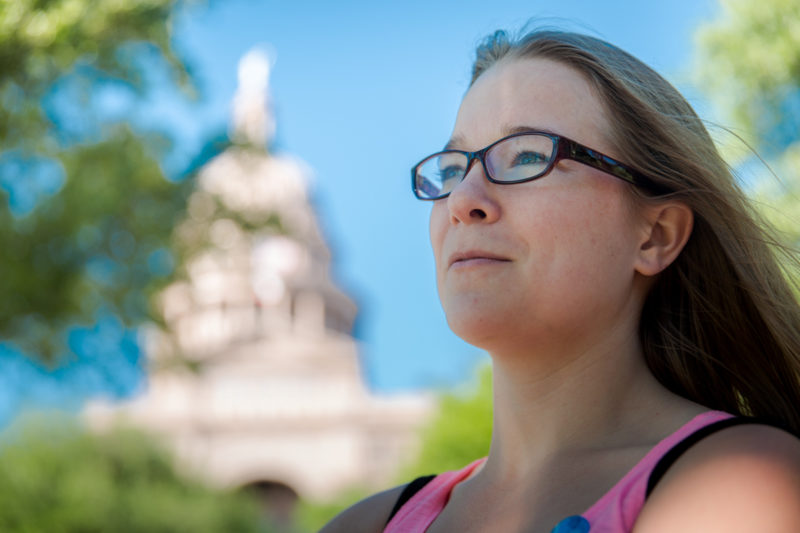Small Nonprofits Bridge the Gap to Support Abortion Rights
By Shelby Knowles
Reporting Texas

Natalie Silvestro, founding member of The Bridge Collective, volunteers to provide transportation to women who need access to women’s health clinics. “All bodies, all choices deserve support, no matter what decision they make or what experience they’ve had,” she said. Shelby Knowles/Reporting Texas
As a slew of bills attempting to restrict women’s access to abortions passes through Texas’ 85th legislative session, pro-choice advocates continue helping women to access abortions, while keeping a close eye on bills that may determine their future.
As larger entities, such as Planned Parenthood, are targeted by anti-abortion legislation and face defunding threats, the burden of maintaining access trickles down to smaller nonprofits.
In 2012, a collective of Austin women formed the nonprofit Bridge Collective to provide support services to pregnant women. The organization started as a team of doulas — women trained to assist women during childbirth and the early stages of motherhood. Access to abortions became The Bridge Collective’s focus after House Bill 2, which imposed a variety of new restrictions on abortion providers, went into effect in 2014.
When clinics began closing and services became scarce, The Bridge Collective’s volunteer-only team responded by providing transportation to the remaining clinics in Texas.
“After HB2, [we] made the decision to shift all resources and volunteer power to providing abortion support, specifically by providing transportation because it was and still is the need,” said Natalie Silvestro, a founding member of The Bridge Collective.
Last year the nonprofit collected $3,500 through individual donations that went toward reimbursing volunteers who help take clients to and from abortion clinics. Volunteers made 21 trips for a total of 3,600 miles; distances ranged from 6 to 600 miles in a day.
While the nonprofit officially serves women who live within 100 miles of Austin, volunteers have helped clients from as far away as Beeville, Yorktown, Killeen, Waco, Flatonia and Corpus Christi. In the past year, the group hosted two training sessions, which added about 40 volunteers, and it’s expanding services to San Antonio.
Wendy Davis, who as a state senator famously filibustered the bill that rerouted The Bridge Collective, continues to advocate for women’s rights and reproductive health through her nonprofit, Deeds Not Words.
“We highlight the work of not just the Planned Parenthoods and NARALs of the world, but the smaller entities that are doing great work and need financial support just as much as some of the big institutions do,” said Davis, a Democrat from Fort Worth. “I think it’s incumbent on us to make sure we help grow awareness of them and the valuable work that they are doing.”
Due to the provisions of HB2, Texas now has only 28 physicians with admitting privileges providing abortions, according to The Texas Policy Evaluation Project. Researchers also found that clinic closures resulted in women spending more on out-of-pocket expenses, such as transportation and overnight accommodations.
For minors who cannot obtain parental consent to get an abortion as Texas law requires, Jane’s Due Process acts as a benefactor. Through a toll-free legal hotline and lawyer referral service, Jane’s Due Process provides representation for pregnant minors who qualify for judicial bypass in cases of neglect, sexual abuse and other special circumstances.
While minors are the organization’s primary clientele, women of all ages call to ask legal questions.
“We get a lot of calls to our hotline from adults because the process is so confusing,” said Amanda Bennett, client services manager at Jane’s Due Process. “There is so much negative news about abortion that even adults are confused about what’s legal.”
In cases that qualify for judicial bypass, Jane’s Due Process connects minors to whatever social services they need, including emergency shelters or domestic violence agencies. Last year, the nonprofit’s three employees, plus numerous volunteers, connected 155 “Janes” with attorneys and provided another 27 with direct assistance in navigating the court system.

Amanda Bennett at the Texas Capitol after Planned Parenthood’s Lobby Day in April. Jane’s Due Processset up an information booth.
To raise awareness, Jane’s Due Process volunteers attend conferences, inform school counselors, nurses and social workers about their program and target teens directly through Instagram ads. However, the majority of its referrals come from web searches and abortion clinics.
The Bridge Collective and Jane’s Due Process are only two of several nonprofits in Texas providing help. The Lilith Fund, Fund Texas Choice and The Texas Equal Access Fund provide financial assistance to women seeking abortions. The nonprofits often work together to provide women with the services they need.
A variety of bills concerning abortion and women’s reproductive rights have been filed in the current legislative session. House Bill 948, authored by state Rep. Tony Tinderholt, R-Arlington, aims to make abortions illegal “from the moment of fertilization upon the fusion of a human [sperm] with a human ovum”.
Sen. Don Huffines, R-Dallas, has filed Senate Bill 258, which would require fetal tissue from an abortion or miscarriage to be buried or cremated. According to Bennett and Silvestro, the bill would further increase the cost of abortion, an already expensive process.
Bennett, who also volunteers with The Bridge Collective, speculates that as more bills pass through the Legislature, the burden of women needing services will grow and the legality of abortions will become hazier.
Regardless what happens this legislative session, Davis wants the momentum for women’s reproductive rights to continue and flourish.
“Persisting in the resistance against these hostile laws is the only thing that’s ultimately going to unwind them,” she adds.